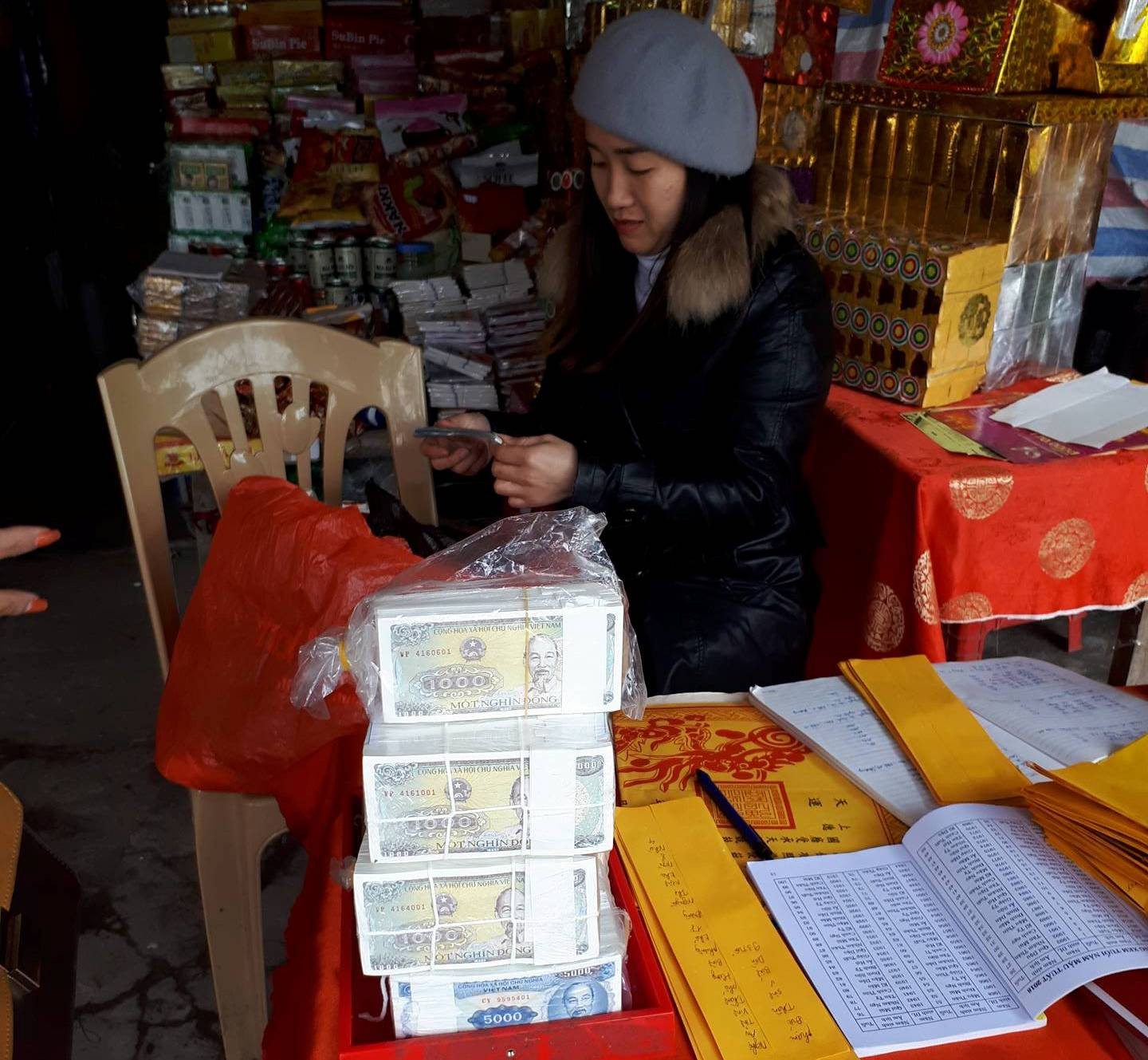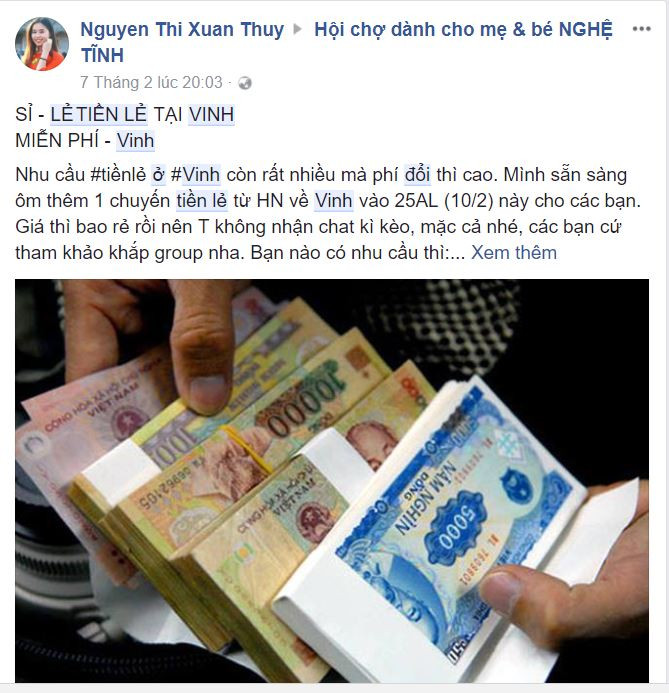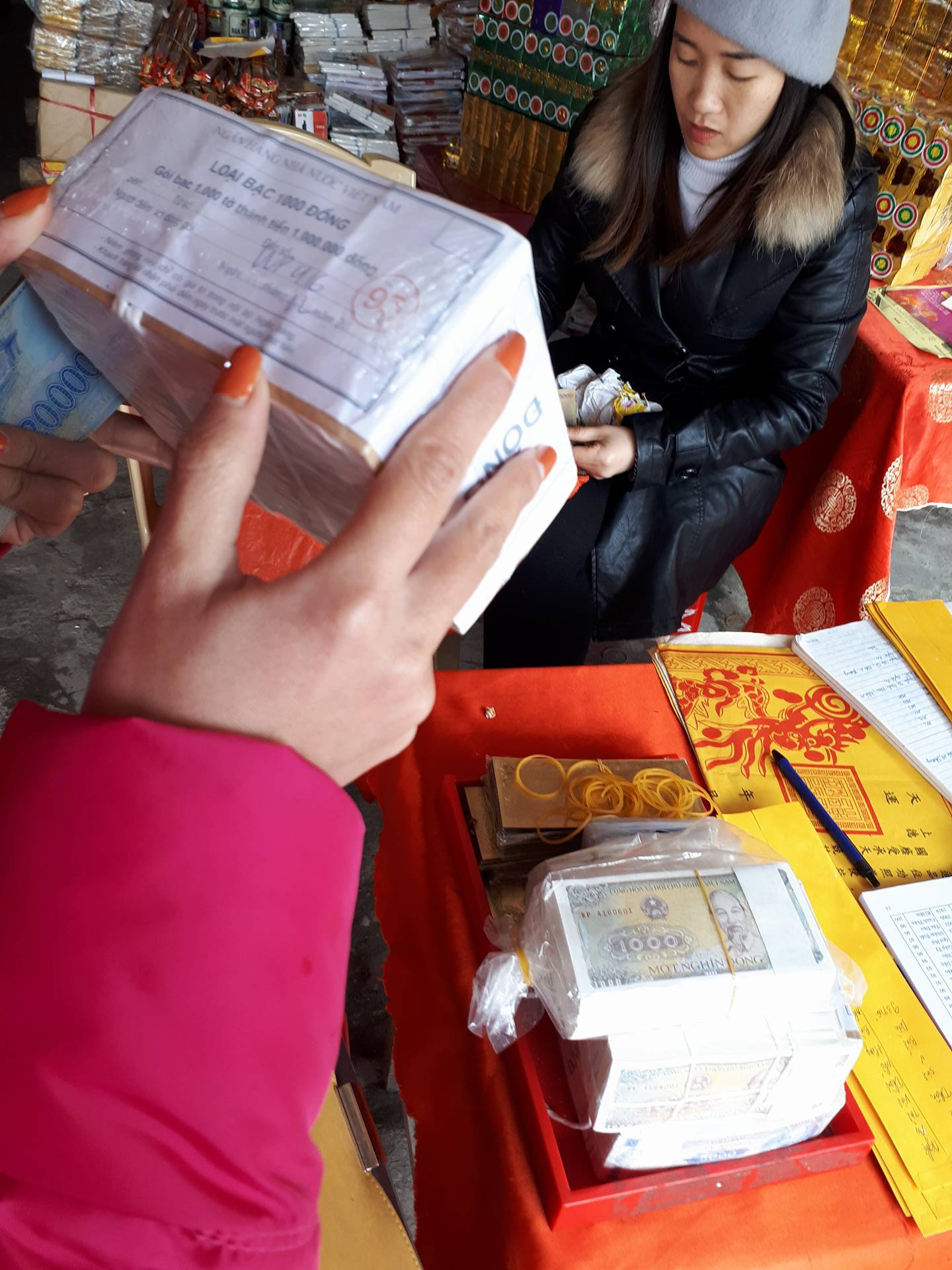Money exchange service chaos with fee collection near Tet
(Baonghean.vn) - Although exchanging small change for a fee has been banned, many shops at Hoang Muoi Temple seem to operate openly, while the Temple Management Board claims to be "powerless".
Fees from 10-70%
A week before Tet, many tourists still flock to the Hoang Muoi Temple relic site (Hung Thinh Commune, Hung Nguyen) to offer incense. Meanwhile, many people come here just to exchange lucky money, go to temples, etc. According to the reporter's records, many shops along the temple entrance openly display thick bags of change to attract customers.
 |
| Bags of coins are displayed publicly at the entrance to Hoang Muoi Temple. Photo: Tien Hung |
Approaching one of these shops, a woman explained the fees for the money exchange service. She said that it was not just small change that could be exchanged, but any denomination. The fees were usually between 10% and 70%.
“The smaller the denomination, the higher the fee. It also depends on the customer and the time. On days close to Tet or when many people exchange, the fee naturally increases, sometimes more than 200% for bills that are exchanged a lot,” said the woman.
The owner of a nearby store offered a price: if you exchange 1 million dong for 10,000 dong bills (100 bills), the fee is 10%. That means the customer has to spend 1,100,000 dong to exchange for 1 million dong in small bills. And for small bills like 500 dong, exchanging 1 million dong costs 800,000 dong in fees.
The shop owner said that the closer to Tet, the higher the fee will be and sometimes the price will fluctuate during the day. In the morning it is 10% but in the afternoon it can increase to 15% if there are many customers ordering. This year, many regular customers even ordered in advance. They ordered mainly 5,000 VND, 10,000 VND and 20,000 VND bills.
According to Decree 96 on penalties for unauthorized activities, if discovered, exchanging small change with a fee will be fined from 20 to 40 million VND.
Mr. Nguyen Van Dan - Deputy Head of the Department of Culture and Information of Hung Nguyen district and Head of the Management Board of Hoang Muoi Temple relic admitted that there was a situation of exchanging small change to collect fees at this temple. However, the management board was helpless.
“We have also communicated and thoroughly instructed that no changes are allowed. We are only responsible for communicating, not having the authority to handle this situation. The management board has also discussed with superiors but they cannot manage this issue,” said Mr. Dan.
Not only operating in temples and pagodas… the service of exchanging small change has recently been taking place openly on social networks. The websites often leave contact phone numbers.
 |
| Publicly exchanging small change for a fee on social networks. |
The reporter contacted one of these phone numbers, and a woman enthusiastically offered to sell. This person affirmed that "you can exchange as much as you want" and did not forget to guarantee that 100% of the money was real. This money changer offered a price of up to 30% for 1,000 VND bills, equivalent to a fee of 300,000 VND for 1 million VND of 1,000 VND bills. Other types of money with denominations of 2,000, 5,000, 10,000 VND had the same exchange rate of 200,000 VND for 1 million VND.
No cases have been punished yet
The head of the Hoang Muoi Temple Management Board said that recently, an interdisciplinary team from the Department of Culture, Sports and Tourism also came to inspect this situation but did not discover any cases of exchanging small change. "I know that when the inspection team came, they collected money under the table, waited for the team to leave and then brought it back up to display again," said Mr. Dan.
Mr. Cao Van Hoi - Deputy Director of the State Bank of Nghe An branch said that in fact, since 2013, the State Bank has implemented the policy of not putting newly printed small denomination money into circulation, which has been recognized and supported by society.
“In the months before and after Tet, no banknotes with denominations below VND5,000 will be circulated. According to a survey, this new money does not serve the purpose of circulating goods but only serves other purposes such as going to pagodas,” Mr. Hoi said, adding that this non-circulation has saved about VND280 billion each year.
Along with not printing new small denomination banknotes, the State Bank has also stepped up inspections and checks on illegal exchange of small bills. However, according to Mr. Hoi, it cannot absolutely guarantee that there will be no fee for exchanging small bills, even though this practice has been banned.
 |
| The fee for exchanging small change here even fluctuates during the day. Photo: Tien Hung |
“In previous years, this situation was public in many places, but recently it has decreased significantly. Some have switched to secret activities. Near Tet, we often coordinate with related departments to inspect and survey spiritual places to rectify the situation,” Mr. Hoi said, adding that since the Decree on penalizing this situation was issued, Nghe An has not yet handled any cases of exchanging small change for a fee.
“This issue requires the involvement of many agencies, especially the Department of Culture and Information. As long as the custom of bringing small change to pagodas or giving lucky money continues, it will be very difficult to eliminate this situation,” Mr. Hoi stated his opinion.
